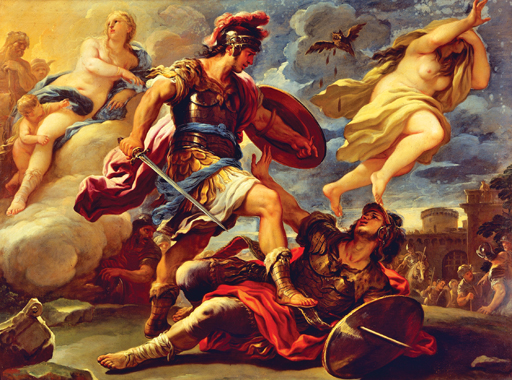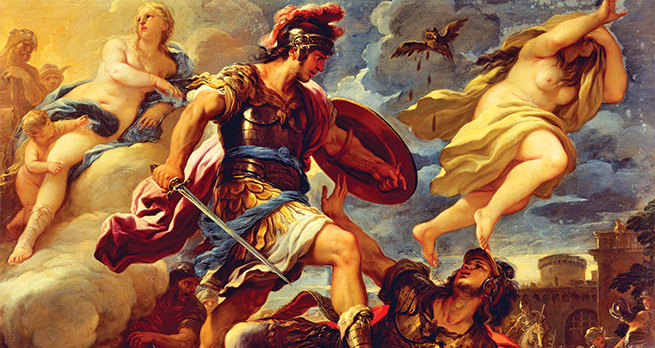4.1 The death of Turnus
The summary given in the previous section takes us to the final lines of the poem, in which Aeneas and Turnus finally meet in single combat.

Activity 3
I’d now like you to read the poem’s last lines, which you can find by going to the section on Virgil’s Aeneid on the ‘Poetry in Translation [Tip: hold Ctrl and click a link to open it in a new tab. (Hide tip)] ’ website. You can find the relevant passage in Book 12 of the poem by clicking on the link ‘Bk XII:887–952 The Death of Turnus’.
Read this passage carefully and make some notes on the following issues:
- How is Turnus presented at this point in the poem?
- Do you think Aeneas should have spared Turnus’ life?
- What do you think of Aeneas’ motivations when he decides to kill Turnus?
- Are you surprised that Virgil ends the poem so abruptly here? What do you think of the ending?
Discussion
The ancient literary critic Servius, who wrote a commentary on the Aeneid in the fourth century ce, didn’t see a moral issue in this passage. According to him, Aeneas was pius to consider mercy, but also pius to avenge Pallas, and so his actions are entirely praiseworthy. It’s true that vengeance was not necessarily considered a bad motive in the ancient world: indeed Augustus was proud to have avenged the murder of his adopted father Julius Caesar, erecting a temple in honour of Mars Ultor (Mars the Avenger) to celebrate this achievement. Most modern scholars, however, have found Servius’ approach oversimplistic, since Virgil goes out of his way to present the situation as ambiguous.
It’s worth bearing in mind that Virgil has deliberately set up a situation in which Aeneas has to make a difficult choice. It’s rare in epic poetry for someone to receive a non-fatal wound, and we might be expecting Aeneas to simply kill Turnus with a single spear cast in battle. Instead Virgil has set up a situation in which Turnus is incapacitated but not killed, and so Aeneas has the option of sparing his life if he chooses to.
I don’t know how you responded to Turnus in this passage, but to me, Virgil stresses his youth and vulnerability at this point. As he lifts the rock to attack Aeneas he is overcome with supernatural weakness and terror caused by divine intervention now that the gods have turned against him. The simile in which Turnus’ experience is compared to the common dream of not being able to run away also speaks to the reader’s own experience and encourages us to empathise with him. It also evokes a very similar passage in Book 22 of Homer’s Iliad, in which the Trojan hero Hector tries to flee from the Greek warrior Achilles. Hector is one of the most sympathetic characters in the Iliad and so, by implicitly comparing Turnus to him, Virgil encourages us to feel pity for the Italian hero. He is alone, abandoned by his sister and by the goddess who previously protected him. In his final speech he humbly accepts his responsibility for causing the war, and offers to give up all his claims, so that Aeneas has total victory without needing to kill him. On the other hand, Turnus has already broken a truce earlier in Book 12. One could argue that he can’t be trusted to keep to his word this time either and that Aeneas needs to do whatever is necessary to secure a lasting peace for the sake of his people.
